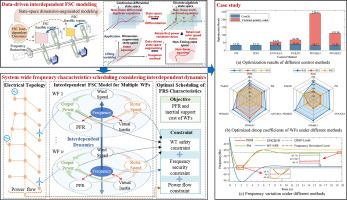Interdependence modeling of wind farm frequency support feasible region: A non-iterative system-wide dynamic characteristics scheduling
IF 11
1区 工程技术
Q1 ENERGY & FUELS
引用次数: 0
Abstract
The provision of frequency regulation support (FRS) services by wind farms (WFs) is of crucial importance for frequency stability of power systems with high-penetration renewable energy. With time-varying wind speed, real-time scheduling for the FRS characteristics of WFs is essential for ensuring the security of system frequency and dynamic power flow (PF). However, the extensive number of wind turbines (WTs) and interdependence of frequency support capabilities (FSCs) among WFs contribute to the complexity of FRS dynamics, rendering the quantification of FRS security of WTs challenging, especially in the absence of precise WT parameters. Therefore, this paper proposes a data-driven method for modeling interdependence of FSCs across WFs. Utilizing space transformation, the original complex nonlinear FRS dynamics of WTs are transformed into a dimension-augmented linear model, facilitating the construction of an analytical expression for FSCs. On this basis, an optimal scheduling model considering the interdependent characteristics of FSCs is developed, which can be solved by employing a hybrid algorithm combining Kriging-assisted surrogate with piecewise elite learning strategy. The simulation results demonstrate that the proposed method enables fast online scheduling of FRS characteristics for WFs, minimizing FRS costs while maintaining system frequency, WTs, and PF security, and enhances computational efficiency by 98.54 % without reliance on physical parameters.

风电场频率支持可行域的相互依赖建模:一种非迭代的全系统动态特性调度
风力发电场提供频率调节支持(FRS)服务对高渗透可再生能源电力系统的频率稳定性至关重要。在风速时变的情况下,对风力发电机的FRS特性进行实时调度是保证系统频率和动态潮流安全的关键。然而,风力涡轮机(WTs)的庞大数量和WFs之间频率支持能力(fsc)的相互依赖性导致了FRS动力学的复杂性,使得WTs FRS安全性的量化具有挑战性,特别是在缺乏精确的WT参数的情况下。因此,本文提出了一种数据驱动的方法来建模跨WFs的FSCs相互依赖关系。利用空间变换,将WTs的复杂非线性FRS动力学转化为增维线性模型,便于构建fsc的解析表达式。在此基础上,建立了考虑fsc相互依赖特性的最优调度模型,该模型采用kriging辅助代理与分段精英学习策略相结合的混合算法求解。仿真结果表明,该方法在不依赖物理参数的情况下,能够快速在线调度WFs的FRS特性,在保持系统频率、WTs和PF安全性的同时,最大限度地降低FRS成本,计算效率提高98.54%。
本文章由计算机程序翻译,如有差异,请以英文原文为准。
求助全文
约1分钟内获得全文
求助全文
来源期刊

Applied Energy
工程技术-工程:化工
CiteScore
21.20
自引率
10.70%
发文量
1830
审稿时长
41 days
期刊介绍:
Applied Energy serves as a platform for sharing innovations, research, development, and demonstrations in energy conversion, conservation, and sustainable energy systems. The journal covers topics such as optimal energy resource use, environmental pollutant mitigation, and energy process analysis. It welcomes original papers, review articles, technical notes, and letters to the editor. Authors are encouraged to submit manuscripts that bridge the gap between research, development, and implementation. The journal addresses a wide spectrum of topics, including fossil and renewable energy technologies, energy economics, and environmental impacts. Applied Energy also explores modeling and forecasting, conservation strategies, and the social and economic implications of energy policies, including climate change mitigation. It is complemented by the open-access journal Advances in Applied Energy.
 求助内容:
求助内容: 应助结果提醒方式:
应助结果提醒方式:


